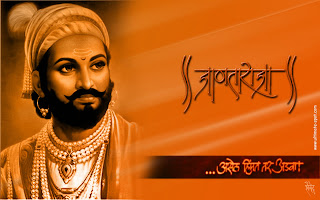Life of Shivaji
Chhatrapati Shivaji Maharaj was born in the hill-fort of Shivneri near the city. While Jijabai was pregnant, she had prayed to the local deity "Shivai" for blessings for her expected child. Chhatrapati Shivaji Maharaj was named after this local deity.[9]
There are no contemporary records of Chhatrapati Shivaji Maharaj's exact birthdate and boyhood.[9] The birthdates of Chhatrapati Shivaji Maharaj given by various records include:
When Chhatrapati Shivaji Maharaj was a novice, a troop of Pathans – Afghan mercenaries – had approached Chhatrapati Shivaji Maharaj requesting enlistment in his army. Chhatrapati Shivaji Maharaj was hesitant, but Gomaji advised him to accept them into the service. This resulted in the secular character of the Maratha armed forces. All the communities enjoyed respect and fair treatment in his kingdom. Gomaji also taught the art of swordsmanship to Chhatrapati Shivaji Maharaj, and especially the effective use of lance, the characteristic Maratha weapon.
According to Tarikh-i-Shivaji, Shahaji placed his jagir (Land holdings / Fiefdom) in the Latur region under Dadoji Konddev, who had shown good administrative skills as the kulkarni (land-steward) of Malthan. In a short time, Chhatrapati Shivaji Maharaj became a skilled swordsman, strategist and an accomplished horseman, trained rigorously by Maratha warriors like Baji Pasalkar.
At the age of 12, Chhatrapati Shivaji Maharaj was taken to Banglore where he was formally trained further. At age of 14, he returned to Pune with a rajmudra (Soveriegn seal) & council of ministers.
Chhatrapati Shivaji Maharaj was extremely devoted to his mother Jijabai. Jijabai led a deeply religious, near ascetic life in virtual isolation. This religious environment had a profound influence on Chhatrapati Shivaji Maharaj. He carefully studied the two great Hindu epics, Ramayana and Mahabharata. The morality and spiritual messages of the epics made a great impression on him. Throughout his life he was deeply interested in religious teachings, and sought the company of Hindu and Sufi (a Muslim sect) saints throughout his life.[9]
As the administrator of Shahaji's jagir (fiefdom), Dadoji Konddeo was accorded complete control over the Maval region. He won over most of the local Maval deshpande (chiefs), and subdued others. Chhatrapati Shivaji Maharaj drew his earliest trusted comrades and a large number of his soldiers from this region, including Yesaji Kank, Baji Pasalkar, Baajiprabhu Deshpande and Tanaji Malusare. In the company of his Maval comrades, a young Shivaji wandered over the hills and forests of the Sahyadri range, hardening himself and acquiring first-hand knowledge of the land. By 1639, he commanded a hardy and loyal band of officers and soldiers..
Chhatrapati Shivaji Maharaj was born in the hill-fort of Shivneri near the city. While Jijabai was pregnant, she had prayed to the local deity "Shivai" for blessings for her expected child. Chhatrapati Shivaji Maharaj was named after this local deity.[9]
There are no contemporary records of Chhatrapati Shivaji Maharaj's exact birthdate and boyhood.[9] The birthdates of Chhatrapati Shivaji Maharaj given by various records include:
- the 3rd day of the dark half of Phalguna, 1551 of Shaka calendar (Friday, 19 February 1630).[2] This date is accepted by the Maharashtra state government as the official birthdate of Chhatrapati Shivaji Maharaj.[10]
- the second day of the light half of Vaisakha in the year 1549 of Saka calendar.[2] (Thursday, 6 April 1627), or other dates near this day.[9][11]
When Chhatrapati Shivaji Maharaj was a novice, a troop of Pathans – Afghan mercenaries – had approached Chhatrapati Shivaji Maharaj requesting enlistment in his army. Chhatrapati Shivaji Maharaj was hesitant, but Gomaji advised him to accept them into the service. This resulted in the secular character of the Maratha armed forces. All the communities enjoyed respect and fair treatment in his kingdom. Gomaji also taught the art of swordsmanship to Chhatrapati Shivaji Maharaj, and especially the effective use of lance, the characteristic Maratha weapon.
According to Tarikh-i-Shivaji, Shahaji placed his jagir (Land holdings / Fiefdom) in the Latur region under Dadoji Konddev, who had shown good administrative skills as the kulkarni (land-steward) of Malthan. In a short time, Chhatrapati Shivaji Maharaj became a skilled swordsman, strategist and an accomplished horseman, trained rigorously by Maratha warriors like Baji Pasalkar.
At the age of 12, Chhatrapati Shivaji Maharaj was taken to Banglore where he was formally trained further. At age of 14, he returned to Pune with a rajmudra (Soveriegn seal) & council of ministers.
Chhatrapati Shivaji Maharaj was extremely devoted to his mother Jijabai. Jijabai led a deeply religious, near ascetic life in virtual isolation. This religious environment had a profound influence on Chhatrapati Shivaji Maharaj. He carefully studied the two great Hindu epics, Ramayana and Mahabharata. The morality and spiritual messages of the epics made a great impression on him. Throughout his life he was deeply interested in religious teachings, and sought the company of Hindu and Sufi (a Muslim sect) saints throughout his life.[9]
As the administrator of Shahaji's jagir (fiefdom), Dadoji Konddeo was accorded complete control over the Maval region. He won over most of the local Maval deshpande (chiefs), and subdued others. Chhatrapati Shivaji Maharaj drew his earliest trusted comrades and a large number of his soldiers from this region, including Yesaji Kank, Baji Pasalkar, Baajiprabhu Deshpande and Tanaji Malusare. In the company of his Maval comrades, a young Shivaji wandered over the hills and forests of the Sahyadri range, hardening himself and acquiring first-hand knowledge of the land. By 1639, he commanded a hardy and loyal band of officers and soldiers..

grat maratha wirrior
ReplyDelete